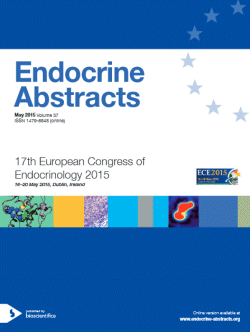Searchable abstracts of presentations at key conferences in endocrinology
Symposia
Beta cell biology
ea0037s22.1 | Beta cell biology | ECE2015
Noncoding genome function in pancreas development and disease
Most genetic mechanisms that are currently known to underlie developmental processes and human diseases are based on the analysis of a very small portion of the genome that encodes for protein-coding sequences. Novel sequence-based technologies, however, have recently disclosed that a major portion of the noncoding genome contains functional regulatory elements. It is thus reasonable to presume that the analysis of such elements can shed new light into developmental and cellul...
ea0037s22.2 | Beta cell biology | ECE2015
Novel therapeutic targets in the β-cell
Metabolic and inflammatory insults contribute to beta-cell failure and apoptosis, in part via the generation of reactive oxygen species (ROS). The pancreatic β-cell acquires sensitivity to the damaging actions of pro-inflammatory cytokines during differentiation, but the mechanisms underlying the differentiation-dependent sensitisation is unknown. By mRNA microarray of a cell-model of β-cell differentiation exposed to cytokines we identified a cluster of tra...
ea0037s22.3 | Beta cell biology | ECE2015
Novel models of human pancreatic beta cells
Despite intense efforts over the past decades, human pancreatic beta cell lines with physiological insulin secretion have not been available. We have developed a robust transplantation model of fetal human pancreases that recapitulates pancreas development and combined such model with integrative lentiviral-mediated gene transfer. This resulted in production of human transgenic pancreases in which dynamic aspects of development can be studied. We thus forced expression of immo...




